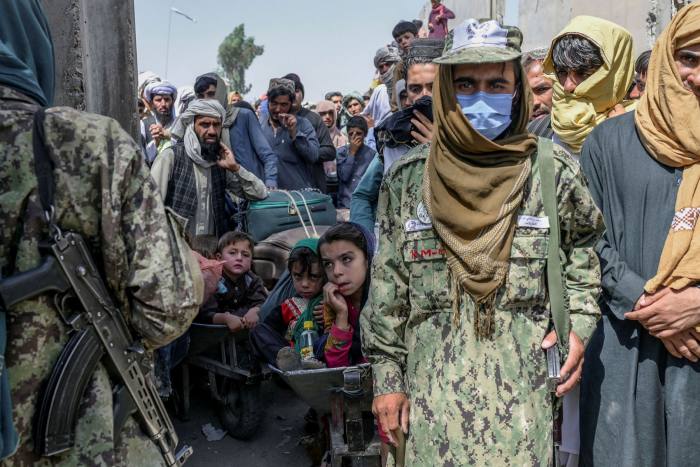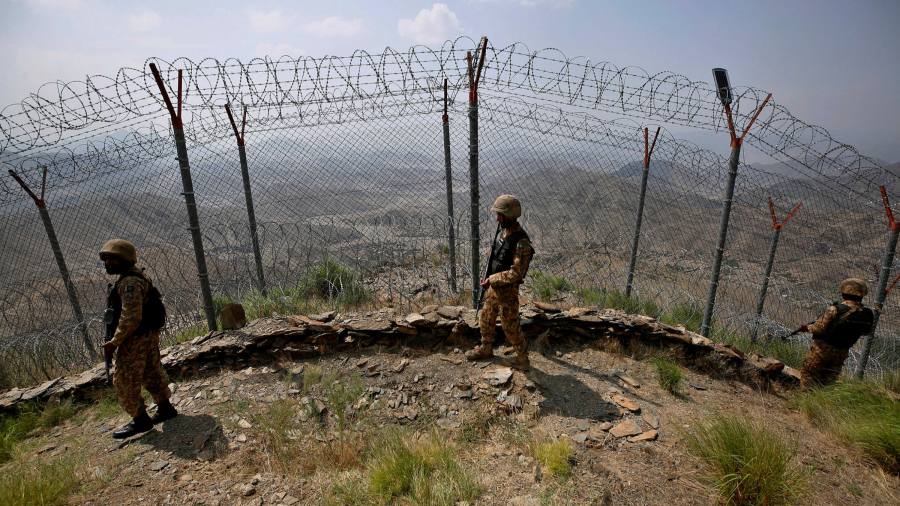Teams of Taliban fighters, dressed within the group’s standard assortment of army fatigues and shawls, have massed on Afghanistan’s lengthy and arid southern border with Pakistan.
The Durand Line, a Nineteenth-century boundary demarcated by British imperialists, is fiercely rejected by many on either side of the border for carving up the standard lands of the Pashtun folks, tens of hundreds of thousands of whom dwell on both facet.
In a collection of choreographed, well-publicised incidents, Taliban fighters dismantled poles and barbed wire erected by Pakistan, accompanied by denunciations from their leaders. In a single video, native fighters appeared to topple a pillar emblazoned with the Pakistani flag and rolled it down a sandy hill.
Pakistan has lengthy been one of many Taliban’s most vital advocates, from brazenly supporting its regime earlier than 2001 to allegedly offering a haven to the group throughout the US battle. Prime minister Imran Khan welcomed the Islamists’ army conquest in August and has lobbied for extra worldwide help for its authorities.
But the Taliban’s victory has unleashed a wave of hardline forces that Khan’s authorities is struggling to regulate, each on and inside Pakistan’s borders. Other than the border stress, these vary from surging violence by emboldened home extremists to a rising political problem from Pakistani Islamist events who determine with the Taliban’s views.

“Whereas some argued that the Taliban’s victory in Afghanistan can be a victory for Pakistan, it was not going to be an uncomplicated victory. We’re seeing that taking part in out,” stated Madiha Afzal, a fellow on the Brookings Establishment.
Afzal stated this was inevitable after the US’s peace settlement with the Taliban, which paved the best way for the militants’ victory and bolstered their legitimacy inside Pakistan. “It was apparent when the Doha deal was signed, almost two years in the past now, that this might embolden all stripes of Islamists/extremists in Pakistan,” she stated.
The Islamist menace is rising concurrently Khan’s authorities making an attempt to steer Pakistan via an financial disaster and implement a collection of unpopular IMF-mandated austerity measures, all whereas shoring up his place in preparation for elections subsequent yr.
He will even must handle tense relations with the Taliban. The Durand Line has been a longstanding supply of friction on either side of the border.
For many years, folks residing on both facet routinely travelled forwards and backwards utilizing rugged routes with out border controls. For a lot of Afghans, together with the predominantly Pashtun Taliban, Pakistani efforts to formalise the border have stoked outrage.
The border has emerged as the most important rift in relations between Pakistan and the Taliban. This stress additionally dangers inflaming Pakistan-based Islamist and Pashtun teams.
Most regarding has been an increase in assaults by the Pakistani Taliban, or TTP. The group, ideologically aligned with however separate from the Afghan Taliban, are fierce enemies of the Pakistan state and are liable for horrific terrorist assaults which have killed hundreds over the previous decade.
Rising TTP exercise since August, and fears that fighters would use Afghanistan to launch cross-border assaults, prompted Islamabad to barter a one-month ceasefire with the group in November.
However the TTP withdrew from the settlement final month, arguing that Pakistan had not honoured circumstances equivalent to releasing dozens of its prisoners.
A number of Pakistani troopers have since been killed in clashes with the group and a senior TTP chief was killed final week in a neighbouring Afghan province.
“Many TTP militants are actually in Afghanistan, from the place they’ve repeatedly tried to assault Pakistan,” stated a Pakistan authorities official based mostly close to the border.
Different hardline Pakistani Islamists, who’re capable of mobilise mass avenue protests and maintain intensive affect within the nation’s networks of madrassas, have made their presence felt in different methods.
Khan’s authorities in November was pressured to raise a ban on a contentious group, the Tehreek-e-Labbaik Pakistan, after they threatened to launch a march on the capital of Islamabad.
The group, which campaigns to implement strict punishment together with dying for blasphemers, had beforehand paralysed central Pakistan after protests towards caricatures of the prophet Muhammad appeared in Charlie Hebdo, the French satirical journal.
Final month one other Islamist social gathering, the Jamiat Ulema-e-Islam, received greater than half of the obtainable seats in native elections within the northern Khyber Pakhtunkhwa province, together with the mayoral race of the provincial capital Peshawar. The province is residence to a lot of Pakistan’s Pashtun inhabitants. JUI’s chief Fazal-ur-Rehman is a vocal member of an anti-Khan opposition coalition.
The prime minister attributed the upset to unhealthy candidate choice by his ruling Pakistan Tehreek-e-Insaf social gathering. However some officers and analysts stated that the victory pointed in direction of a extra sustained electoral problem.
“There’s nervousness over the Taliban consolidating their place in Afghanistan and influencing their surrounding area,” stated one senior businessman. “Even when it’s simply the newest native elections, the end result will affirm the worst fears.”
Husain Haqqani, a senior fellow on the Hudson Institute and former Pakistani ambassador to the US, stated that historical past was repeating itself. “Each time . . . the Taliban have been in energy, there has undoubtedly been a spillover of Taliban beliefs and concepts into Pakistan,” he stated.
“Pakistan thought serving to the Taliban win energy in Afghanistan would be the finish of Pakistan’s Pashtun and Afghan issues. I believe it’s only the start.”

